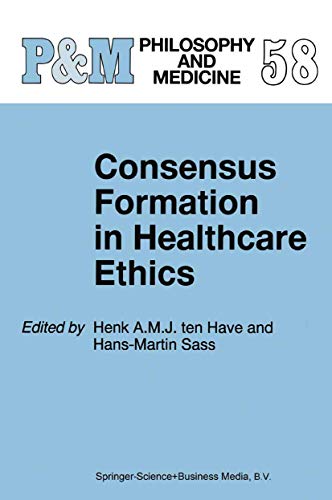Verwandte Artikel zu Consensus Formation in Healthcare Ethics: 58 (Philosophy...

Inhaltsangabe
debating (and possibly ratifying) the Convention at the national level [13]. The Convention identified basic principles necessary for the applica tion of medicine and the life sciences. It set out to protect the dignity and identity of all human beings: "The interests and welfare of the human being shall prevail over the sole interest of society or science" (art. 2). It also requests that appropriate measures be taken to provide equitable access to healthcare of appropriate quality. The principle of respecting the free and informed consent of the person is clearly stressed. The issue of interventions on persons unable to provide an informed consent has been controversial for a long time; in the first draft, the exact formulation of the relevant article remained open. Now it states that interventions may be carried out on persons with impaired decision-making capacities, but only for their benefit, and only if minimal risks and minimal burdens are imposed. Consensus apparently exists over a broad range of issues. Privacy and free access to information are defined as rights, in article 10. Discrimination against a person on the basis of his or her genetic heritage is prohibited. Sex selection in medically assisted procreation is prohibited (except to avoid serious hereditary, sex-related diseases). Financial gain from using the human body and its parts is explicitly prohibited. The more controversial issues in bioethics are not addressed in this Convention, however. An exception is research on embryos in vitro.
Die Inhaltsangabe kann sich auf eine andere Ausgabe dieses Titels beziehen.
Reseña del editor
debating (and possibly ratifying) the Convention at the national level [13]. The Convention identified basic principles necessary for the applica tion of medicine and the life sciences. It set out to protect the dignity and identity of all human beings: ''The interests and welfare of the human being shall prevail over the sole interest of society or science" (art. 2). It also requests that appropriate measures be taken to provide equitable access to healthcare of appropriate quality. The principle of respecting the free and informed consent of the person is clearly stressed. The issue of interventions on persons unable to provide an informed consent has been controversial for a long time; in the first draft, the exact formulation of the relevant article remained open. Now it states that interventions may be carried out on persons with impaired decision-making capacities, but only for their benefit, and only if minimal risks and minimal burdens are imposed. Consensus apparently exists over a broad range of issues. Privacy and free access to information are defined as rights, in article 10. Discrimination against a person on the basis of his or her genetic heritage is prohibited. Sex selection in medically assisted procreation is prohibited (except to avoid serious hereditary, sex-related diseases). Financial gain from using the human body and its parts is explicitly prohibited. The more controversial issues in bioethics are not addressed in this Convention, however. An exception is research on embryos in vitro.
Reseña del editor
Consensus is an important topic in bioethics. Approaches to consensus formation developed over the last decade to establish standards of clinical practice are now extended to moral issues. Healthcare ethics committees, ethics advisory boards, and national ethics committees aim at creating and formulating consensus. The essays in this volume analyse the various dimensions of consensus formation. They demonstrate the clinical, institutional and political context of consensus regarding ethical issues.
Consensus formation as a dialogic and discursive activity is also deeply influenced by the socio-cultural context, as examples from Europe, Japan and the U.S. illustrate. Specific problems in consensus formation are discussed in regard to genetic counseling, psychiatry, treatment decisions in family medicine, futility, and reproductive technology. The essays in the volume explore the potentials and problems of forming consensus at various levels of health care in modern pluralist societies.
„Über diesen Titel“ kann sich auf eine andere Ausgabe dieses Titels beziehen.
Neu kaufen
Diesen Artikel anzeigenEUR 13,79 für den Versand von Vereinigtes Königreich nach USA
Versandziele, Kosten & DauerSuchergebnisse für Consensus Formation in Healthcare Ethics: 58 (Philosophy...
Consensus Formation in Healthcare Ethics (Philosophy and Medicine)
Anbieter: Ria Christie Collections, Uxbridge, Vereinigtes Königreich
Zustand: New. In. Artikel-Nr. ria9789048149933_new
Anzahl: Mehr als 20 verfügbar
Consensus Formation in Healthcare Ethics
Anbieter: moluna, Greven, Deutschland
Zustand: New. Artikel-Nr. 5818853
Anzahl: Mehr als 20 verfügbar
Consensus Formation in Healthcare Ethics
Anbieter: AHA-BUCH GmbH, Einbeck, Deutschland
Taschenbuch. Zustand: Neu. Druck auf Anfrage Neuware - Printed after ordering - debating (and possibly ratifying) the Convention at the national level [13]. The Convention identified basic principles necessary for the applica tion of medicine and the life sciences. It set out to protect the dignity and identity of all human beings: ''The interests and welfare of the human being shall prevail over the sole interest of society or science' (art. 2). It also requests that appropriate measures be taken to provide equitable access to healthcare of appropriate quality. The principle of respecting the free and informed consent of the person is clearly stressed. The issue of interventions on persons unable to provide an informed consent has been controversial for a long time; in the first draft, the exact formulation of the relevant article remained open. Now it states that interventions may be carried out on persons with impaired decision-making capacities, but only for their benefit, and only if minimal risks and minimal burdens are imposed. Consensus apparently exists over a broad range of issues. Privacy and free access to information are defined as rights, in article 10. Discrimination against a person on the basis of his or her genetic heritage is prohibited. Sex selection in medically assisted procreation is prohibited (except to avoid serious hereditary, sex-related diseases). Financial gain from using the human body and its parts is explicitly prohibited. The more controversial issues in bioethics are not addressed in this Convention, however. An exception is research on embryos in vitro. Artikel-Nr. 9789048149933
Anzahl: 1 verfügbar

